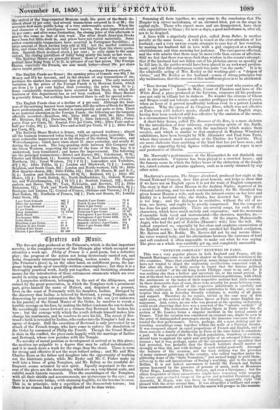"ENTENTE CORDIALE" RENEWED IN PARIS.
This was a very popular phrase in both England and France, till the Spanish Marriages came to cast their shadow on the amicable relations of the two countries. Since that eventfulperiod, many things have occurred which have not tended to dispel the unpleasing recollections connected with it. But after all, there is little reason to regret that the famous political "entente cordiale" of the old King Louis Philippe came to an end ; for it was nothing else than a hollow and uncertain tie, as the result proved. It was at the most but a conventional watchword between politicians, with which the sentiments or the tastes of their respective nations had little concern. In these democratic days of ours, there is no security for peace between coun- tries, unless the good-will of the respective inhabitants is carefully and mutually cultivated. Every means that contributes to this end; every en- terprise that aids in fostering friendly relation; is worthy of all praise and support. Therefore do we rejoice, trivial as the case may at first sight seem, at the revival of the Italian Opera at Paris under English ma- nagement. And, certes, no one who was present at the opening on Saturday could avoid observing that here was a renewal of the "entente cordiale" of a social kind. The restoration of the Italian Opera in Paris under the di- rection of Mr. Lumley forms a singular incident in the lyrical annals of France. That the occasion was considered an unusual one, might be seen in the array of distinguished personages among the immense concourse that at- tended the first performance. Never, perhaps, did a more striking and in- teresting assemblage come together within the walls of a Parisian theatre. It was composed almost in equal proportions of French and English, and of these scarcely a family of distinction in Paris at the time failed to constitute a part. It was natural that the English population, transitory or resident, should turn to applaud the spirit and enterprise of an esteemed fellow-coun- tryman ; but it was perhaps, under all the circumstances of opposition that had preceded, less probable that the French habitues should muster so strongly as they did, and with feelings of such cordial good-will. Amongst the features of the occasion, not the least striking was the presence of many eminent politicians of the country, who rallied together under the glittering dome of the "Salle Ventadour," and seemed happy to yield them- selves up to the soft intoxications of Sontag's warbling, and to the music of Bellini It is not indeed uncommon to behold the French and Italian operas honoured by the presence of persons of mark, such as Messieurs Victor Hugo, Lamartine, niers, Berrycr, and even a Cavaignac ; but the oldest frequenter of these amusements might have remarked with surprise the severe and spectacled visage of the grave and potential President 4411e Assembly, M. Dupin, who was there on Saturday, apparently right "...ell pleased with the scene around him. It was altogether a brilliant and auspi- cious commencement, and I trust that the season will prosper in like manner.


























 Previous page
Previous page